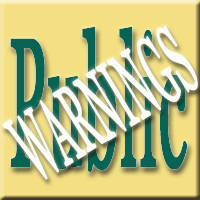
• Home •
Victim´s Story •
Fraud Prevention •
Project GSO •
Hall of Shame •
LINKS •

Facts for Internet Users
Law Enforcement Authorities in Australia
Report a scam
If you have been scammed or think you have seen a scam, there are many government agencies in Australia that you can contact for advice or to make a report. The best agency to contact depends on where you live and what type of scam is involved. If you are not sure which agency would be the best one to contact in your circumstances, contact the ACCC Infocentre on : 1300 302 502.
- Scams from interstate or overseas—contact the ACCC
Financial and investment scams—contact ASIC
- Banking and credit card scams—contact your bank or financial institution
Local scams—contact your local office of fair trading (consumer affairs agency)
- New South Wales
- Victoria
- Queensland
- Western Australia
- South Australia
- Tasmania
ACT
Northern Territory
--Reporting spam emails—contact ACMA
Reporting fraud, theft and other crimes—contact the police
- Scams from interstate or overseas—contact the ACCC
The Australian Competition and Consumer Commission (ACCC) is the only national agency dealing with general consumer protection and restrictive trade practices matters. The SCAMwatch website is published by the ACCC.
You can report a scam to the ACCC electronically by filling out the report a scam form below. This form will go directly to the ACCC’s Infocentre staff.
Report a scam to the ACCC (electronic form opens in new window)
You can also report a scam by phoning the ACCC Infocentre on 1300 302 502. The Infocentre is staffed between the hours of 8.30 am and 6 pm.
The Infocentre is the primary contact point of the ACCC. If appropriate, information received is passed on to investigators. Callers can also be provided with information by Infocentre staff on their rights and responsibilities as businesses or consumers. If Infocentre staff cannot help they will usually suggest the appropriate government department or agency to contact or give you information about any other options that may be available. The ACCC does not give legal advice and recommends that a solicitor is the most appropriate person from whom to seek such advice.
- Financial and investment scams—contact ASIC
Financial scams are scams that involve sales offers or promotions about financial products and services such as superannuation, managed funds, financial advice, insurance, credit or deposit accounts. Report financial scams to the Australian Securities and Investments Commission (ASIC) on 1300 300 630.
You can find more information and report financial scams on ASIC's consumer website, FIDO.
- Banking and credit card scams—contact your bank or financial institution
As well as reporting these scams to ASIC or the ACCC (see above), you should alert your bank or credit union when a scam involves your bank or credit union account.
Many scams arrive in the form of emails or phone calls claiming to be from your bank or financial institution (for example, phoney fraud alerts or ‘phishing’ scams), or otherwise try to access your accounts.
You should telephone your bank or financial institution if you are suspicious of an email, letter or phone call that claims to be from them, or if you think someone may have access to your accounts. They can advise you on what to do next. Make sure the telephone number you use is from the phone book or your account statement, ATM card or credit card.
- Local scams—contact your local office of fair trading (consumer affairs agency)
While the ACCC is the only national agency dealing with general consumer protection matters, state and territory agencies also have specific jurisdictions in relation to scams.
The consumer protection provisions administered by the ACCC (for example, against misleading and deceptive conduct) can also be found in state and territory fair trading acts. These acts—as well as more specific laws and safeguards like those dealing with door-to-door sales—are administered by the office of fair trading or consumer affairs agency in your state or territory (the name of the agency varies from state to state).
Your local office of fair trading or consumer affairs agency is best placed to investigate scams that appear to come from within your own state or territory and you should report these scams using the links below.
Some of the state and territory agency websites below also name specific practices that they consider to be scams operating in their state or territory. But remember that these lists are not exhaustive and the ACCC does not endorse nor warrant the accuracy or completeness of this information.
- New South Wales
Office of Fair Trading
13 32 20
Scam Smart - information
Report a scam to News South Wales
- Victoria
Consumer Affairs Victoria
1300 558 181
Scam information
Report a scam to Victoria
- Queensland
Office of Fair Trading
13 13 04
Scam Smart - information
Report a scam to Queensland
- Western Australia
Department of Consumer and Employment Protection
1300 30 40 54
WA ScamNet - information
Report a scam to Western Australia
- South Australia
Office of Consumer and Business Affairs
08 8204 9777
Scam alert - information
Report scam to South Australia
- Tasmania
Consumer Affairs and Fair Trading
1300 654 499
Scam information
Report a scam to Tasmania
- ACT
Office of Fair Trading
02 6207 0400
Scam information
Report a scam to the ACT
- Northern Territory
Consumer and Business Affairs
08 8999 1999
Scam information
Report a scam to the Northern Territory
- Reporting spam emails—contact ACMA
Many scams arrive by email. You can report any uninvited emails (know as spam emails) to the Australian Communications and Media Authority (ACMA). You can also download ACMA’s ‘SpamMATTERS’ button for Microsoft Outlook or Outlook Express. When you press the SpamMATTERS button, the spam email is forwarded to ACMA and deleted from your system. Installing SpamMATTERS will not stop the spam reaching you, but it can help ACMA to trace where the spam is coming from.
Fraudulent (or 'phishing') emails requesting personal details can also be reported to the bank, financial institution or other organisation concerned (be sure to use a phone number or email address that did not appear in the email to make your report).
Reporting fraud, theft and other crimes—contact the police
Many scams that may breach consumer protection laws (those enforced by the ACCC, ASIC and fair trading agencies) may also breach the fraud provisions of various crime acts. If you are the victim of fraud—if you have suffered a loss because of someone’s dishonesty or deception—you should consider contacting your local police station (especially if the amount involved is significant).
You should definitely contact the police if you have had your property stolen or been threatened or assaulted by a scammer.
www.scamwatch.gov.au
© by GSO • Contact